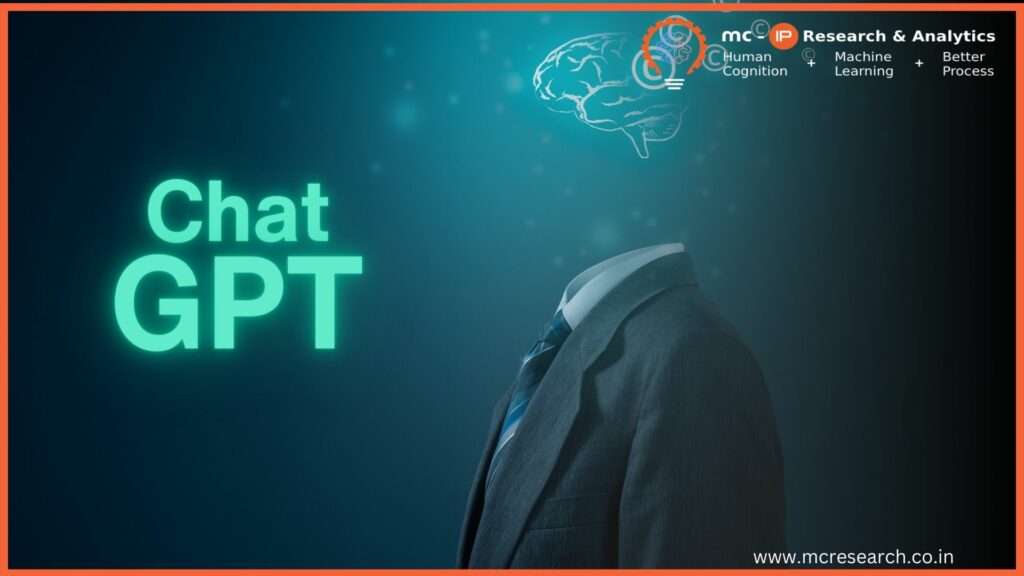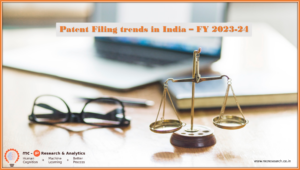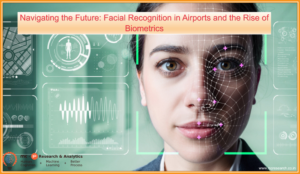ChatGPT, powered by the advanced GPT 3.5 language model, has revolutionized the field of natural language processing. Its applications extend beyond simple conversation to include complex tasks like patent search, where it has the potential to enhance efficiency and accuracy. With illustrative examples, this article will try to unearth the advantages and limitations of deploying ChatGPT for patent searches.
Before delving into this topic, in our previous blog we presented a comparative study that evaluates the performance of ChatGPT in patent analysis, comparing it with the expertise of manual analysis. Have read it yet! Please take a moment to go through it.
Through these series of blogs, we aim to assess how ChatGPT fares in the realm of patent analysis and its potential as a valuable tool.
In the previous blog, it was concluded that to ensure accurate and relevant responses from ChatGPT, providing specific details and context in the questions is quintessential. Including relevant keywords, technical terminology, and any specific requirements or constraints helps ChatGPT understand the query’s technicality and domain and generate responses tailored to a specific need and gets better aligned with the desired topic or field of interest.
A. Step 1 of ChatGPT patent search - Providing necessary context
So our patent expert asked ChatGPT a question related to performing a patent search for the technology “Nanotechnology in sustainable packaging for food”.
As we already know, nanotechnology has made significant strides in the development of sustainable packaging for food. Nanocomposites, such as nano clay-based, silver nanoparticle-based, and carbon nanotube-based composites, have been extensively studied and applied in the field. These types of nanocomposites are effective in improving barrier properties, providing antimicrobial functionalities, and enhancing the strength and flexibility of packaging materials. By leveraging the unique properties of nanoparticles, nanocomposite technology has the potential to revolutionize the packaging industry, offering eco-friendly solutions that prolong the shelf life of food products while reducing environmental impact.
Moving on to the capabilities of ChatGPT, this language model is designed to engage in interactive conversations and provide assistance on a wide range of topics. It utilizes a vast amount of pre-existing knowledge and contextual understanding to generate responses. Will it be able to perform conduct a comprehensive and thorough patent search? Let’s find out
Patent expert – ChatGPT, I am going to perform a patent search for the technology “Nanocomposite in sustainable packaging of food”. What should be my first step to carry out a patent search and getting results relevant to the technology I mentioned? Can I start with searching all the relevant keywords?

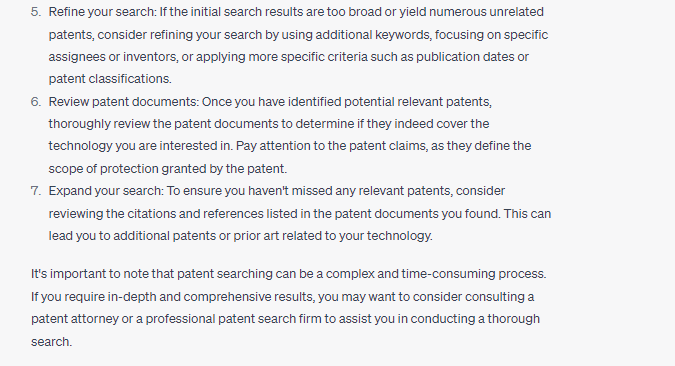
According to the above answer, ChatGPT has provided the responses that are more aligned with any patent expert’s goals, as the necessary context was provided in the question. This, in turn, aids in leveraging the capabilities of ChatGPT to optimize the patent search process and obtain more meaningful results. But is this information enough?
Surely not. But after reviewing the initial query posed to ChatGPT we considered refining it to make it more specific or targeted. Our patent experts modified the keywords, included additional criteria and parameters related to nanocomposite materials or sustainable food packaging, and provided more context to guide the search. A more refined query might help narrow down the search and improve the relevance of the results.
B. Step 2 of ChatGPT patent search - Extracting initial strategy
Patent expert – ChatGPT, could you prepare all the key string combinations for the initial patent search on the patent database? Please make sure all combinations are considered with all the proximity relations of words with each other using AND, OR, and other relevant operators.
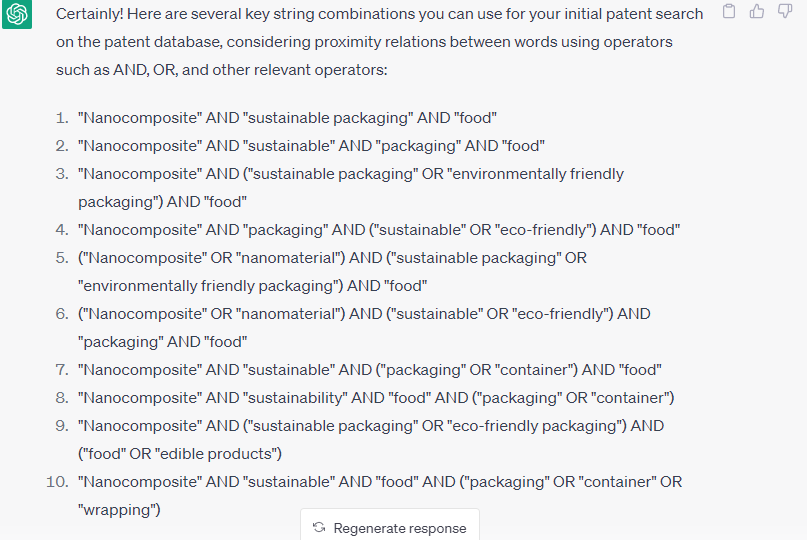
Is this response correct? If yes, is it a comprehensive key string?
While ChatGPT could provide quite relevant key strings, these key strings alone were insufficient to initiate the patent search. Specifically, only the operators specified in the questions were used, and synonyms for ‘nanocomposite’ and other focus terms of the technology were not utilized.
There are certain important things to notice that were missing in ChatGPT’s response like
- Relevant synonyms
- Relevant IPC/CPC
- Operators such as +, W, D, *, ?, etc. were not utilised
Why ChatGPT’s response was not comprehensive?
ChatGPT only provided search strings using AND and OR operators. However, patent searches involve complex queries with multiple operators, search fields, and criteria. It’s possible that the query provided was intricate, making it difficult for ChatGPT to generate a comprehensive response.
Hence we thought of modifying the question, like the one below:
Patent expert – I understand that all synonyms are not utilized for example polymers most frequently used in food packaging are polyethylene, polypropylene, polystyrene, polyvinyl chloride (PVC), polyethylene of technology, and more. In addition to that Nanocomposite could be also mentioned as Nano composite. This is just one example for your reference, there could be various other representations of the same keyword in any patent. Let’s say Packaging can be written as pack or packet, or package so we can use the “+” operator after the common set of letters. Could you update the key strings? I have another request if you can provide all key strings in one paragraph rather than different points?
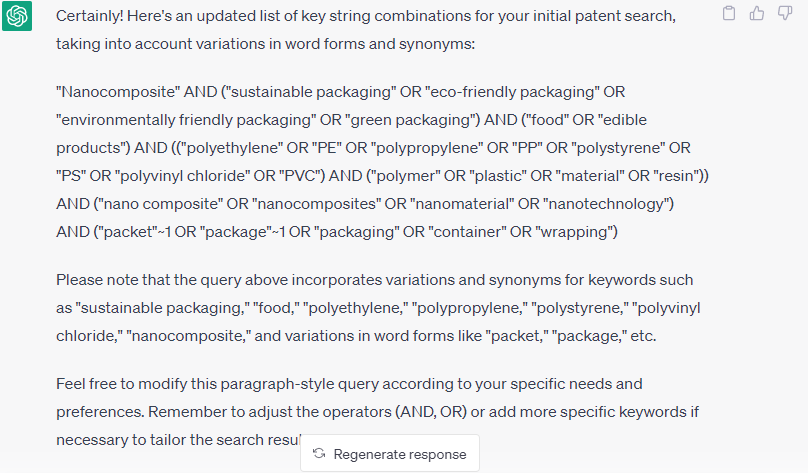
To summarize, to incorporate all the relevant operators, including OR, +, and wildcards (*), ChatGPT needs to be fed with a more thorough and effective search strategy by considering variations and synonyms in the keywords. Additionally, patent searching often requires specific details about the technology or industry. If the context provided in the query is insufficient or ambiguous, it could limit ChatGPT’s ability to retrieve relevant information.
To improve the comprehensiveness of ChatGPT’s responses for patent searches, one needs to provide specific details about the technology, industry, or field of interest, along with the specific query. Also, it cannot provide real-time information or access proprietary databases.
C. Patent expert - ChatGPT could you share all the operators one can use to make key string?
So what do we understand about using ChatGPT for patent search. Using ChatGPT for patent search can be helpful in certain aspects, but there are limitations to consider.

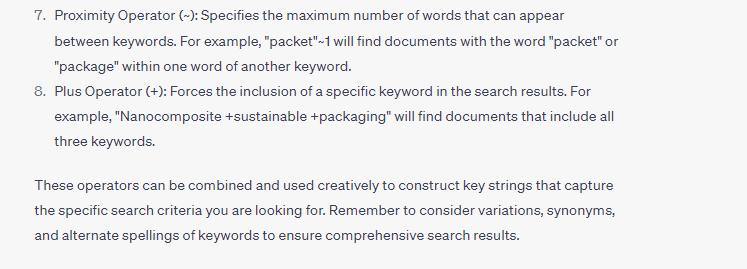
Advantages of Leveraging ChatGPT for Patent Search
- Quick analysis: ChatGPT can be used for quick and preliminary searches to get an initial overview of existing patents in any domain.
- Concept exploration: ChatGPT can assist in exploring and understanding patent-related concepts. It can provide explanations and general information on patent terminology, classification systems, and other relevant topics.
- Query formulation: ChatGPT can help formulate search queries by explaining different operators and providing suggestions based on its pre-existing knowledge.
- Saves time : ChatGPT provides a quick and accessible platform to gather preliminary information and insights.
Limitations of Leveraging ChatGPT for Patent Search
- Lack of domain expertise – ChatGPT lacks deep domain-specific knowledge, which may result in misinterpretation or incomplete analysis of complex nanocomposite concepts in sustainable food packaging or any other technology domain (we will explore other technologies in our next series of ChatGPT blogs)
- Ambiguity and Inconsistency – ChatGPT provides vague and inconsistent responses in patent search results emphasizing the importance of manual review and expert analysis for critical decision-making.
- Limited training data – ChatGPT’s knowledge is not real-time. With the rapidly evolving nature of the technical context during the course of the research and development, keeping ChatGPT up to date with the latest patent information requires continuous training with newly added data, which may not always be readily available.
It is important to acknowledge these limitations and use ChatGPT as a supportive tool rather than a dependent solution for patent search. While ChatGPT can assist in streamlining the search process, it is crucial to use it to supplement its outputs with human expertise, manual review, and validation to ensure comprehensive and accurate analysis.
At MCRPL while we recognize that patent search cannot be performed by AI-build platforms alone, we aim to explore how ChatGPT can augment the patent analysis process when utilized alongside human experts. By conducting a comparative study, we seek to gain insights into the unique strengths and limitations of ChatGPT in patent analysis, highlighting the importance of human expertise in this field. MCRPL always deploys a Human + AI approach through our in-house proprietary tool MCRANK that makes sure that we provide 100% quality and comprehensive reports in all our projects. Contact us to know more about our service offerings and unique ways of conducting projects.

